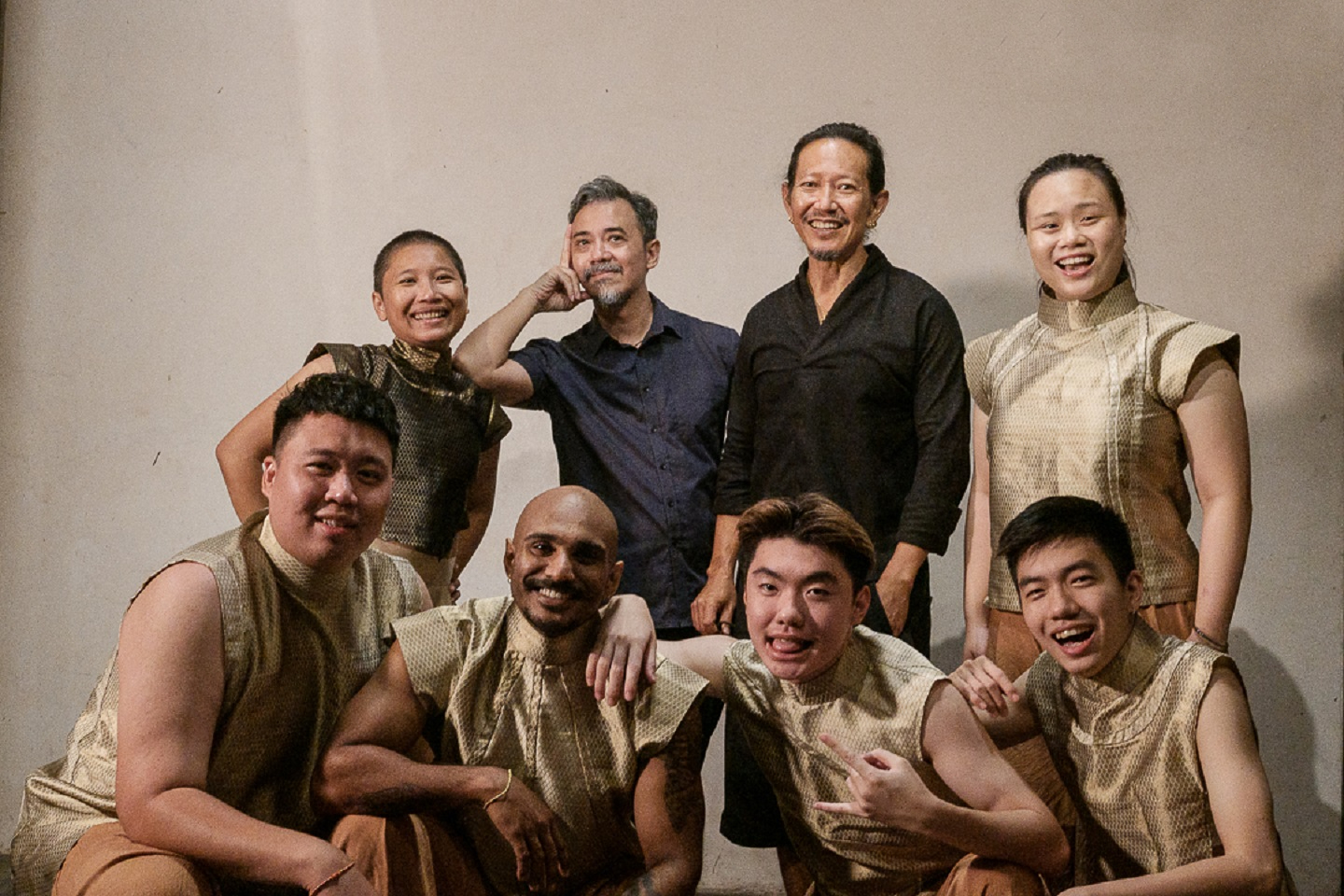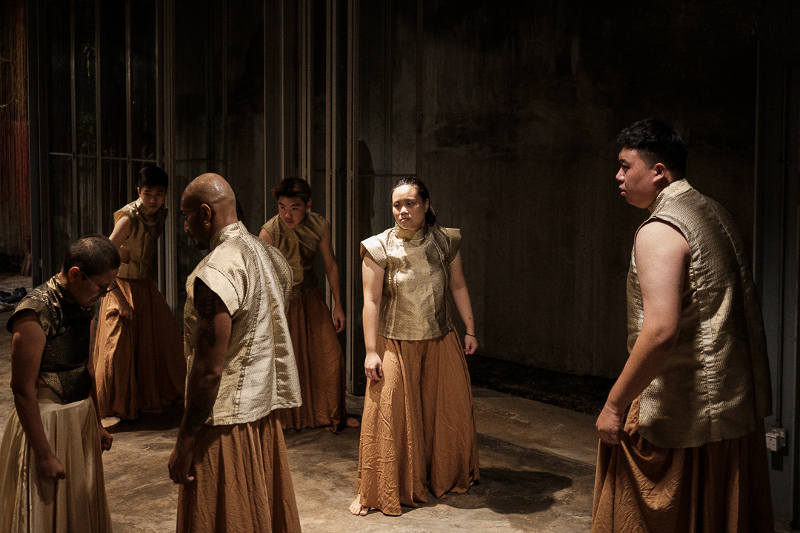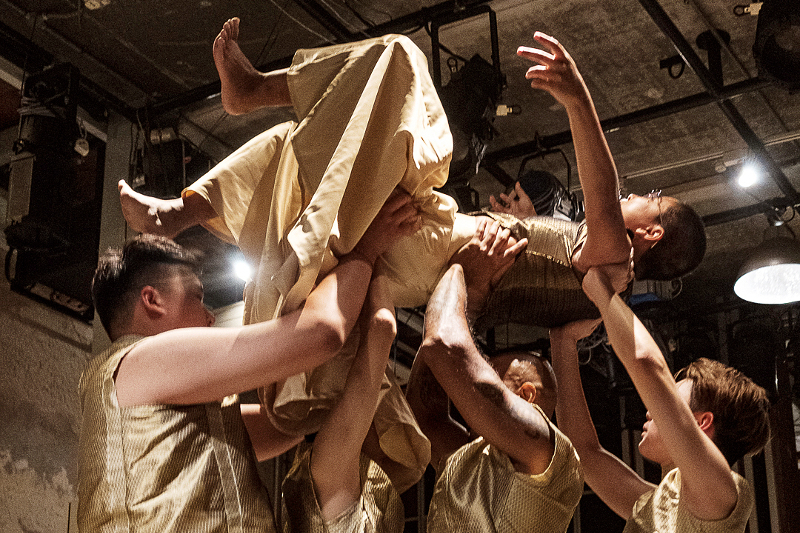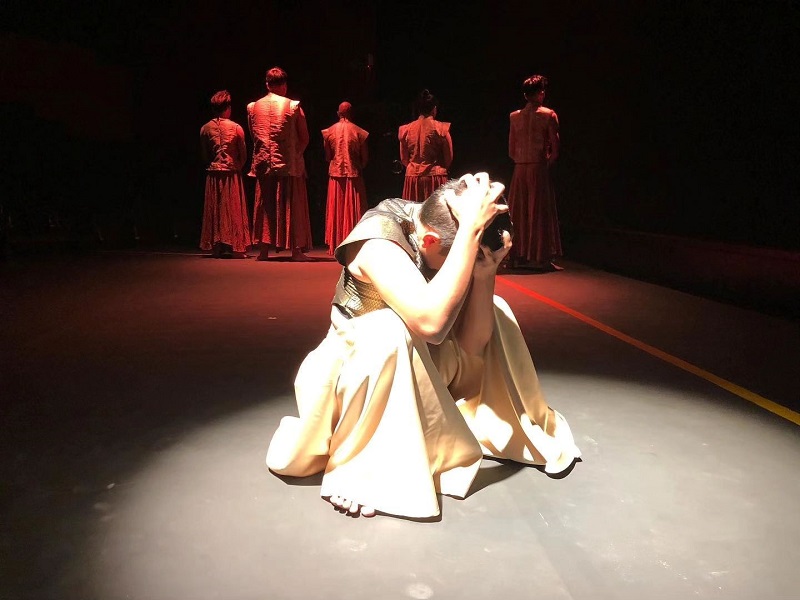
Clockwise from top left: Hilyati, Johan, Chee, Tan, Teoh Chee Lin, Wong Wei Hern, Ngooi, Kabilan and Desmond Ngooi (All photos: Malam Takdir)
It will be enough for Chee Sek Thim if someone leaves the theatre after watching Malam Takdir and asks, “Why is it I am feeling this way?” Not that he has any answer. In fact, he finds himself wondering about issues and arguments from reading episodes in the Mahabharata, one of which figures in the new opera he is directing.
Chee is fascinated by the complexity of the ancient Sanskrit poem that inspired Malam Takdir. The Mahabharata presents a moral dilemma with no simple solutions in a sophisticated way that raises discussion without imposing any kind of rightness or wrongness on family, war, duty and destiny, hope and betrayal, fate and human volition, he says.
“For once, things are not clear-cut, and this is an extremely useful situation to present, especially in this age where we are looking for quick answers and solutions to often very complex subjects that have historical baggage and circumstances we may not be aware of.”
malam_takdir_rehearsal_-_hilyati_ramli_teoh_chee_lin_kabilan_wong_wei_hern_tan_jin_yin_desmond_ngooi.jpg

What is clear in Malam Takdir is the story of the Blind King who ascends the throne after pledging to return it to his brother’s five sons when they come of age. Things then happen, leading to a predestined war.
On the eve of the battle, the king’s aide predicts that his 100 sons will be killed by their cousins and begs him to stop the war. While the king blames the inevitability of fate, he also banks on his sons triumphing. He then “watches” them being slain, as narrated by the aide, who can see events from a distance.
For Chee, reading up on the context of this episode in the epic, finding out who the characters are and trying to make sense of what is going on, such as the prior circumstances of the conflict, was an incredible educational process.
The main idea that drives the war is duty: the functions we have to fulfil according to the roles we have been given in life and what happens, in the process, if we create disharmony or conflict. The question that arises is: What happens when you are both a father and a king? If there are conflicting interests, are you, both as a father and a king, wrong? Or are you, both as a father and a king, right?
malam_takdir_rehearsal.jpg

Chee appreciates texts that attract him on one level and lead to layers of hidden meaning as he works on them. The element of time plays a role in allowing these revelations to come forth. Essentially, it is the complexity of such texts that attracts him as a director.
As for the most significant aspect of the Blind King’s story, it is the greyness of decision-making and how we perceive problems or people, which may not necessarily mean that is how they actually are. “The grey areas of judgement are what we need to consider when we interact with each other and deal with other people because it’s very easy to jump to conclusions."
Malam Takdir was first presented as a play in Penang in 2019. The current show, supported by Yayasan Sime Darby and Creador Foundation, is a continuation of that project. It will premiere in George Town on July 21, before a two-day run in Petaling Jaya. It is playwright-cum-music director Johan Othman’s second opera, after The Conference of the Birds (2008), produced by Five Arts Centre. Chee, who taught acting and directing at Universiti Sains Malaysia before retiring in June, is the director of all three.
362977591_735881028548061_68143263844779908_n.jpg

Hilyati Ramli, a strong dramatic performer who carried the text in the first round, is with the present cast. Classically trained singer Tan Jin Yin plays Suara, who narrates the olden-day story in classical Western-style opera. The rest of the performers provide the rhythms and sounds, essentially treating the text like a score.
“What we do is try to understand what the actors have and work with their abilities. That’s interesting because Johan did not complete the musical score before we started the opera.”
Johan wrote the particular melody line for the arias and gave him what was essentially a menu of rhythms — a set of sounds. “What he told me was, ‘Use this and see how you can insert the smorgasbord of performative elements as we build the performance’. This gives me a lot of leeway in seeing what the performers can and cannot do.”
Malam Takdir was originally written and presented in English. But when Chee asked Johan who his target audience was, and he said Malays, they went through literally the whole process of writing the script in Bahasa Melayu together with the actors. When that was done, the text was retranslated into English for the subtitles.
“Obviously, the challenges of working in Bahasa Malaysia are not that different from working in the English language... We still have to go through drills and rework the tongue to articulate the words in a particular way, and we still have to pay attention to the phrasing of the texts. The important thing is that some of the actors are more proficient than others, and the ones who are a little bit less proficient have stayed the course even though they are not comfortable with the language,” says Chee.
'Malam Takdir' will be staged at Nero Event Space, PJPAC, 1 Utama E, PJ on Aug 5 (3pm and 8.30pm) and Aug 6 (3pm). Tickets at RM70. Buy here.
This article first appeared on July 17, 2023 in The Edge Malaysia.


